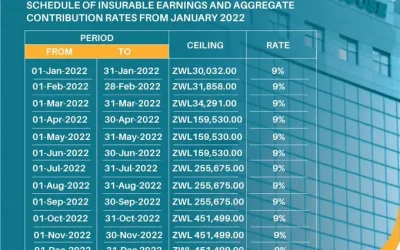ZIMRA audits are a routine part of ensuring tax compliance. They can be a stressful experience, but with proper preparation and understanding, you can navigate them effectively.
Common Reasons for Audits
- Risk Assessment-ZIMRA may target businesses based on factors like industry, size, or past compliance history.
- Information Sharing: Information from other government agencies or third parties can trigger an audit.
- Random Selection: Sometimes, audits are conducted on a random basis.
- Whistle blowing: Disgruntled employees, competitors may report illicit deals.
ZIMRA is mandated by section 4 of the Revenue Authority’s Act to;
- a) to act as an agent of the State in assessing, collecting and enforcing the payment of all revenues; and
- (b) to advise the Minister on matters relating to the raising and collection of revenues; and
- (c) to perform any other function that may be conferred or imposed on the Authority in terms of this Act or any other enactment
ZIMRA is empowered to conduct Audits and Investigations through;
- Income Tax Act Chapter 23:06 (section 44)
- VAT Act Chapter 23:12 (Compliance sections 57 to 66)
- Customs and Excise Act Chapter 23:02 (various sections)
- Revenue Authority Act (section 34F)
Dealing with ZIMRA
It very important for the taxpayer to take note of the following when dealing with ZIMRA during audits and investigations.
- Be prepared and do not panic.
- Cooperate with ZIMRA officials.
- Public officer or designated persons to deal with ZIMRA.
- Maintaining professional conduct-impacts on penalty determination.
- Burden of proof rests with taxpayer in all instances.
- Avoid contradicting oneself.
- Be assertive when answering questions.
- Provide ZIMRA officials with all the requested information timeously.
- Seek professional guidance when not sure.
- Voluntarily disclose and explain any anomalies.
ZIMRA is mandated by section 4 of the Revenue Authority’s Act to;
- a) to act as an agent of the State in assessing, collecting and enforcing the payment of all revenues; and
- (b) to advise the Minister on matters relating to the raising and collection of revenues; and
- (c) to perform any other function that may be conferred or imposed on the Authority in terms of this Act or any other enactment
ZIMRA is empowered to conduct Audits and Investigations through;
- Income Tax Act Chapter 23:06 (section 44)
- VAT Act Chapter 23:12 (Compliance sections 57 to 66)
- Customs and Excise Act Chapter 23:02 (various sections)
- Revenue Authority Act (section 34F)
Dealing with ZIMRA
It very important for the taxpayer to take note of the following when dealing with ZIMRA during audits and investigations.
- Be prepared and do not panic.
- Cooperate with ZIMRA officials.
- Public officer or designated persons to deal with ZIMRA.
- Maintaining professional conduct-impacts on penalty determination.
- Burden of proof rests with taxpayer in all instances.
- Avoid contradicting oneself.
- Be assertive when answering questions.
- Provide ZIMRA officials with all the requested information timeously.
- Seek professional guidance when not sure.
- Voluntarily disclose and explain any anomalies.
Prevention Tips
- Maintain Good Records: Consistent record-keeping is essential for avoiding audit issues.
- Stay Updated: Keep up-to-date with tax law changes and industry-specific regulations.
- Seek Professional Advice: Regular consultations with a tax professional can help prevent errors and misunderstandings.



